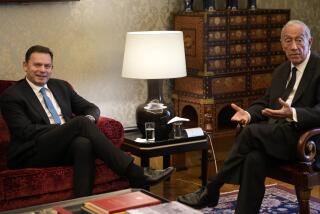A Moderate for Portugal
- Share via
Portugal has chosen Mario Soares, a hero of the struggle to reetablish democracy in his country, to be the first civilian president since 1926. The choice is understandable. Soares will need all of his heroic talents if his nation is to climb out of its deep economic difficulties.
The wisdom and moderation of Portugal’s electorate had been demonstrated a month ago in the first round of the presidential election. The two who led the race and faced each other in the final election Sunday, Soares and Diogo Freitas do Amaral, are men of moderation, committed to the European connection that had been cemented with entry into the European Economic Community on Jan. 1, opposed to the extremes of fascism, which was overthrown in 1974, and to communism, which Soares so effectively resisted after the 1974 revolution.
Soares, as leader of the Socialists, has served repeatedly as prime minister, but lost in parliamentary elections last October to a center-right government led by Prime Minister Anibal Cavaco Silva, who campaigned on behalf of Soares’ opponent in the presidential election. That assures tension between the prime minister, who holds most of the powers of government, and the president, whose influence can be imposed only indirectly. But that is nothing new. Soares, as prime minister, was in perpetual conflict with the out-going president, Gen. Ramalho Eanes.
Part of Portugal’s problem is illustrated by the difficulty in creating a durable government. Moderation prevails, but the votes are so widely dispersed that no party has a majority and prime ministers must rely on fragile coalitions to govern. Soares himself won election by a narrow margin, less than 52%, but that was double his standing in the first round last month. His Socialist Party had won only 21% in the October parliamentary elections, and the party of the present prime minister won less than 30% of the votes in the election that brought him to power.
More to Read
Sign up for Essential California
The most important California stories and recommendations in your inbox every morning.
You may occasionally receive promotional content from the Los Angeles Times.













